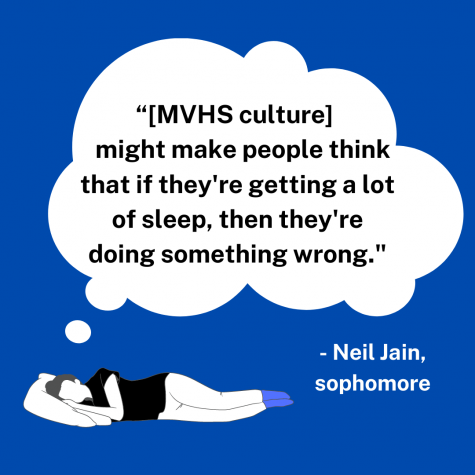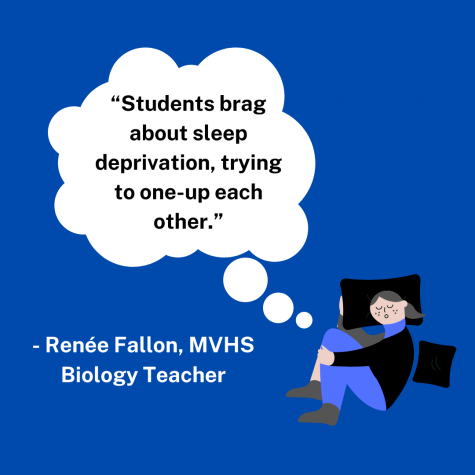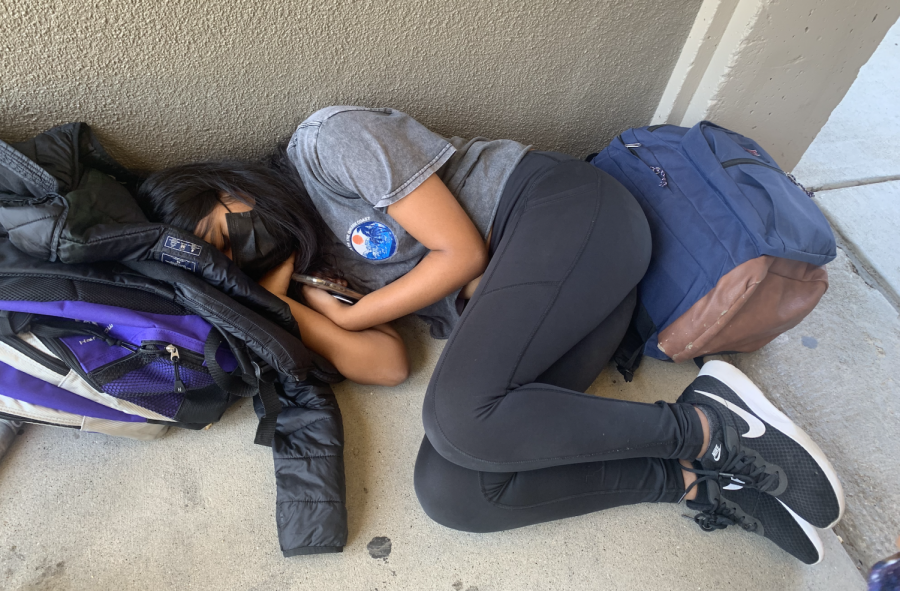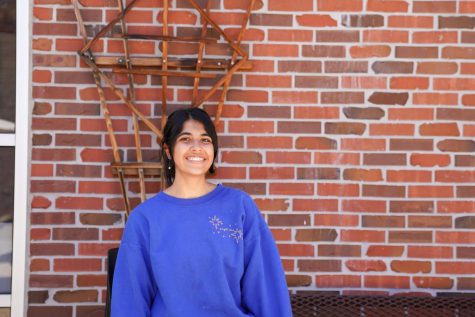“I only got 4 hours of sleep”
Exploring why students boast about limited hours of sleep
Junior Aria Agarwal takes a nap on the floor during lunch break after getting 5 hours of sleep the night before.
September 18, 2021
“I only got 4 hours of sleep last night.”
Beginning first period with the discussion of late bedtimes and exhaustion is just another typical morning conversation starter for many MVHS students. In fact, several students have become so used to hearing similar statements that the negative implications these statements can hold doesn’t even strike them.
Most doctors recommend 8-10 hours of sleep each night for teenagers, and a good night’s sleep contributes to increased levels of focus and energy throughout the day, especially for students. However, MVHS students remain notorious for taking pride in a lack of sleep, specifically in regard to studying.
For junior Divya Venkataraman, the discussion of sleep does not come up frequently in her own circle of friends, but she says it is very common among her classmates. Venkataraman herself tries to maintain a doctor-recommended sleep schedule despite her busy course load and extracurriculars, and believes that MVHS’ rigorous academic culture plays a big part in the discussion of sleep among students.
“The competitive environment that surrounds MVHS students [makes them] feel [that] doing work often should be prioritized more than anything else, including things for your health [like] sleep,” Venkataraman said. “[MVHS students] feel as though [a] lack of sleep is a measurement of how dedicated [they] are to [their] work. And because of that, they think that boasting about their lack of sleep would thus equate to [being] more smart.”
 Similarly, sophomore Neil Jain has continually heard students in his classes talk about their lack of sleep in a positive light and believes that this discussion could be traced back to a pressure MVHS students may feel to sle
Similarly, sophomore Neil Jain has continually heard students in his classes talk about their lack of sleep in a positive light and believes that this discussion could be traced back to a pressure MVHS students may feel to sle![]() ep later in order to match the competitive culture of the school.
ep later in order to match the competitive culture of the school.
“[MVHS culture] might make people think that if they’re getting a lot of sleep, then they’re doing something wrong,” Jain said. “If [MVHS students] get a lot of sleep they might be thinking that they aren’t challenging themselves enough. If they aren’t challenging themselves enough, they probably [think that they] don’t deserve to go to the school.”
In fact, Jain feels that on nights when he faces a lack of sleep, he experiences weaknesses in his daily performance, specifically in his athletics. Venkataraman feels similarly — when she experiences a repetitive lack of sleep, her academic abilities, including concentration, are negatively impacted. ![]()
While students recognize their own and their peers’ pride in a lack of sufficient rest, MVHS staff has also noticed these conversations and their negative implications around campus.
AP Biology teacher Renée Fallon says she’s astonished when hearing students in the Student Union and rally court brag about sleeping late at night. Fallon agrees that a big reason for this pride comes from a self-assurance of a good academic work ethic. She believes that students who choose hard courses and end up sleeping late studying for them should not complain because it was their choice to take the class.

“Students brag about sleep deprivation, trying to one-up each other,” Fallon said. “They use their lack of sleep as a proxy for all of the work they do. If [a student] can’t get themself organized, [they] shouldn’t take those courses.”
Fallon advocates for eight to nine hours of sleep at night for students to perform better at school, and cites how a lack of sleep can increase stress and the likelihood of developing mental illnesses to motivate students to increase the amount of sleep they get. She believes that bragging about a lack of sleep indicates a bad student rather than an extremely studious one, and wishes students would instead praise each other for having a healthy sleep schedule rather than a poor one.
With in-person school returning after over a year of virtual learning, the coursework and pressure on students has already started to ramp up. For many students, this means more late nights, less sleep and a large addition of “I’m so tired” comments in class.
However, this school year many MVHS students are trying to make shifts to their sleep schedule and Venkataraman fully supports the initiative. She has just one piece of advice to her fellow peers on the subject: “Get some sleep, people!”





























